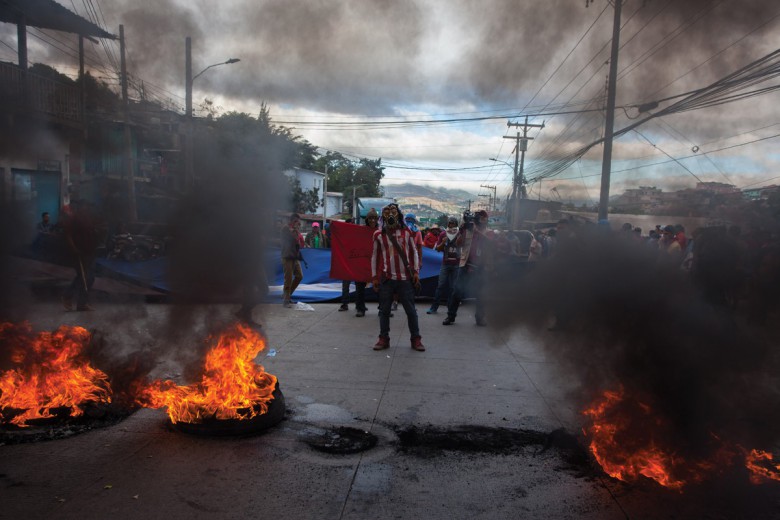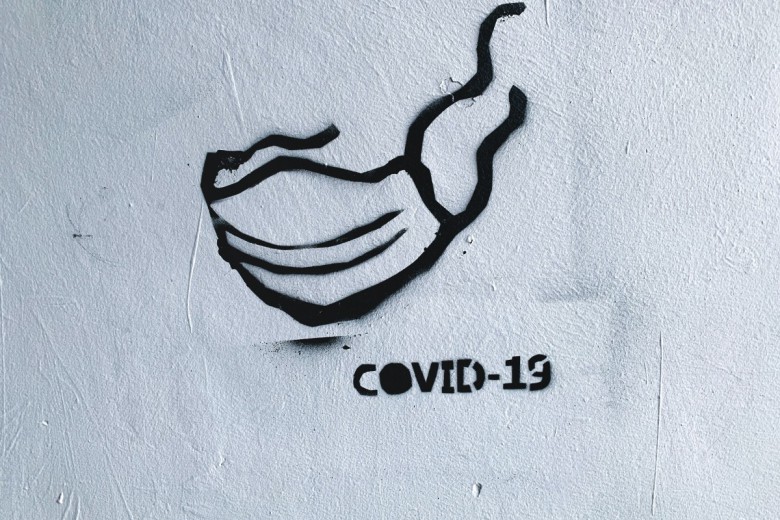The COVID-19 pandemic, the current economic crisis, and how governments, corporations, and people fighting for social justice respond to them are going to have lasting and far-reaching consequences for everyone – from changes to borders to policing to public services. To prepare for the months ahead, Briarpatch hosted a webinar to help people who support radical social change understand the forces that are trying to shape responses to the crisis.
Isaac Murdoch, an Ojibway storyteller and knowledge keeper; Nandita Sharma, a professor of racism, migration, and transnationalism; David McNally, an historian and editor of the Marxist political journal Spectre; John Clarke, an anti-poverty organizer; and David Camfield, a labour studies and sociology professor took turns sharing their understanding of the crisis and their expectations – and hopes – for what lies ahead.
A truly global crisis
“What we’re experiencing right now is the catastrophic failure of the capitalist market system,” McNally says. “The convergence of these two – an economic downturn and a global pandemic – is what is making this situation so catastrophic.”
McNally points out that even before the pandemic, the world was facing a global debt crisis that had already kneecapped states’ capacity to respond to a public health emergency. “There are 48 countries in the world that are spending more right now on international debt payments than they are on their health-care system,” he says. “They are literally sacrificing the money that could save lives, to pay off global banks, [the] International Monetary Fund, [the] World Bank, and so on.”
Murdoch notes that for Indigenous Knowledge Keepers, the arrival of such a crisis comes as no surprise. “If you don’t treat the animals right, sickness is going to come. If you don’t treat the water right, sickness is going to come,” he says. “And it has, many times.”
“For my people the animals were always our government and they reminded us of natural laws,” he explains. He says the pandemic is a reminder that “we have to go back to the natural laws of this land. That’s how we’re going to survive. But that’s very difficult in today’s world.”
“They are literally sacrificing the money that could save lives, to pay off global banks, [the] International Monetary Fund, [the] World Bank, and so on.”
Sharma agrees. “The current organization of our world – whether we are talking economically, politically, socially – is not fit to respond to the COVID-19 epidemic, nor is it able to address our otherwise everyday needs.” She adds that just as the crisis is global, so too must be the response. “The crisis puts on the agenda for all of us what it would mean to decommodify human life so that housing and food and recreation and health care and so on were not market commodities, but human rights – and we need to think of those not just in national but in global terms.”
She believes that will be acutely challenging for today’s left. “I think we’re living in a time where the left is the least internationalist […] than perhaps at any other time in our history.” But she warns that “If we don’t address global inequalities, we are surely condemned to repeat this pandemic for the foreseeable future if we survive.”
State capitalism and nationalism
Camfield warns against the tendency of some on the left to view governments’ recent economic interventions as heralding a new era of socialism in North America. He gave the example of a headline accompanying a recent Jacobin article on America’s corporate bailouts: “Socialism for corporations. Brutal capitalism for everyone else.”
“The policies that we’re looking at are policies that aim to stabilize the capitalist social order and to keep it going, even if modifications need to be made to it,” he says. “They’re trying to minimize the damage to the legitimacy of the status quo. [...] Even if the state actually takes control of some private firms because of the crises, that’s not a socialist measure,” he says. “We should know in Canada that Crown corporations are not socialism.”
"Even if the state actually takes control of some private firms because of the crises, that’s not a socialist measure.”
“Looking forward, I think we can be pretty clear that state activity is going to further increase,” he predicts. “I think the more that firms are unable to produce and distribute the critical supplies that are needed and maintain the priority services that are required, it’s more likely that states will start to step in to coordinate or to directly deliver or produce goods and services. [...] I think there is a trend toward the state bureaucratically directing or planning certain parts of production, not relying on markets, in a kind of war economy fashion.”
He notes that while some of the policies being implemented by the government are going to change people’s expectations about the role and the power of the state, that won’t necessarily translate into long-term improvements for marginalized people. “It shows that the state can do things differently, particularly around income support, and that probably is going to raise expectations in spite of the intentions of governments,” he says. But “the fact that expectations are going up doesn’t give us the power to win. That’s a separate question.”
He quotes the economist Costas Lapavitsas, who warns that “The colossal power of the state and its ability to intervene in both economy and society could result, for instance, in a more authoritarian form of controlled capitalism in which the interests of the corporate and financial elite would be paramount. This demands that socialists assess carefully and critically the actions that states are taking to deal with the coronavirus crisis.”
“National governments have opportunistically used COVID-19 to further fortify their borders as well as transfer wealth to capitalists, as we just saw in the United States."
“This COVID-19 epidemic is going to exacerbate the shift toward authoritarian governments and fascism,” Sharma agreed, adding that the shift is already happening – as Trudeau closes the border to all “non-essential” travel, migrants crossing the U.S.-Canada border on foot will be handed over to U.S. authorities, and likely deported. “National governments have opportunistically used COVID-19 to further fortify their borders as well as transfer wealth to capitalists, as we just saw in the United States,” Sharma adds, referencing President Donald Trump’s $2 trillion financial stimulus package.
Sharma adds that border controls, like the ones Canada has enacted, don’t do anything to curb the spread of illness – nor are they intended to. “The point of border controls is that when [migrants] get in they’re incredibly vulnerable and subordinated.”
From her home in Hawai’i, she points out that “Most of us are not saying you know, ‘Don’t let Auntie back into Honolulu.’ right? We’re saying ‘Don’t let that stranger, that foreigner, that person who doesn’t belong in Hawaii, don’t let them back in,’ even though it’s much more likely that Auntie is going to give us COVID-19, right? As we found out from the studies in China, this stay-at-home order may be the deadliest order we have, because in China what we discovered is that the clearest line of transmission was from one family member to another, right? So again the feminist insight that the home is not necessarily the most safe space is once again showing itself to be true.”
Who pays for crisis?
Clarke notes that when gains are won, it’s thanks to worker organizing – not sudden government benevolence. “I don’t think this ushers in a period where the capitalist state is going to be more benign,” he says. “On the contrary, right now, even in the face of this crisis, it’s action that is being taken by workers and by working-class communities that is pushing back and forcing [governments] to go further with regard to meeting people’s needs.”
He adds that the fight doesn’t end when the pandemic does. “There’s going to be a bill that is going to be due for getting through this period and they’re going to do everything they can to pass it on to working-class populations.”
“This crisis underlines the way in which we are dealing with a fundamental contradiction between capitalism and life,” McNally explains. “Essentially life-sustaining activities are in conflict with a system designed for the accumulation of capital through profit. And it’s illustrated right now with the manic push to ‘get everybody back to work’ to save the economy, to rescue the economy. And that’s coming not only from Donald Trump, it’s coming from the Wall Street Journal, it’s coming from major bankers and so on. So that we had, for instance, the former CEO of Wells Fargo Bank in the U.S. come out and say two days ago, ‘We will gradually bring those people back and see what happens. Some of them will get sick. Some may even die. I don’t know.’“
“There’s going to be a bill that is going to be due for getting through this period and they’re going to do everything they can to pass it on to working-class populations.”
Clarke agrees. “It’s a crisis of legitimacy for the capitalist system itself,” he says. “I believe we’re in a situation now that that crisis has become so profound that radical, socially transformative and revolutionary solutions are what are pointed to.” He adds that “this is a period in which anti-capitalist ideas can enter the political mainstream in a way that we’ve never seen before.”
But that doesn’t mean the fight won’t be hard. “A kind of solidarity for survival has to be built, and it has to be global in nature,” he adds. “It has to challenge the right, it has to challenge racism, and it has to be based on fighting demands and bold plans for action.” The old ideas and tactics are not up to the challenges that lie ahead. “We have to look at ways to build mass movements and those mass movements have to be infused with ideas that are radically transformative and profoundly anti-capitalist.”
Murdoch is hopeful that the crisis of capitalism would bring about something new and better. “I want things to fall apart so that we can build something beautiful,” he says. “This current system is not working. This current system only brings death.”
Silver linings & socialist inspiration
“We’ve had the saying ever since the global justice movement of the early 2000s that ‘another world is possible,’ and in all kinds of ways that’s precisely what this crisis demonstrates,” McNally says.
“All kinds of things which were ‘impossible’ two months ago have become possible,” he continues. “Spain and Ireland have taken over private hospitals for public health care; we have free transit in a whole number of cities including Houston, Texas, where I live right now; General Motors has been re-purposed to produce not automobiles but ventilators; we have rent and debt freezes in a whole variety of jurisdictions; we have cities and counties across the U.S. which have opened the jails and the prisons; we have enormous pressure growing, including here in Texas, to move all detainees out of [Immigration and Customs Enforcement facilities] and some have already been ordered out by the courts; we have states guaranteeing people’s wages when they’re laid off; we have mothers in Los Angeles seizing housing that is unoccupied and saying ‘This is an anti-pandemic measure, we are simply taking this housing’; we have workers who are striking for life, striking for masks, striking for hazard pay, and so on.”
“All kinds of things which were ‘impossible’ two months ago have become possible.”
But Camfield warns that the state is not where leftists should be looking for guidance on how to build a more just society. “There are certainly developments that have positive potential from a socialist perspective – [but] not things that the capitalist state does, though,” he said. “Mutual aid; do-it-yourself actions by workers to close workplaces or get personal protective equipment; measures to get people the supplies they need in the face of the pandemic; and all the different forms of solidarity that will emerge in the face of the pandemic, the crisis, and the future of austerity – that’s where we should be looking for socialist inspiration.”
Murdoch agreed that it’s important for everyone – but especially for Indigenous Peoples – to build alternatives to the capitalist market. “You know, the government, they hold my people hostage in the programs-and-services economy. They’ve completely erased any sort of sustainable land-based economies because they don’t want us to be free, they don’t want us to have our own governments, so we’re in like concentration camps on our reserves,” he explains. “But our people are breaking free, and we’re going back to the land, we’re going back to those laws, and those animals are becoming our government again. And it feels good because it’s hope.”
Camfield adds that we aren’t starting from scratch. “We need to learn from the examples of the kind of resistance that people often organized under martial law,” he says. “Where they were legally prohibited from assembling in public spaces.”
Murdoch explains that Indigenous communities have a long history of organizing under conditions that criminalize political gatherings. During the years when the Indian Act banned ceremonies and political organizing – a ban that was vigorously policed – “Our people were very resilient in making sure that those things survived underground,” he says, noting that activists organized under cover of night, using secret symbols to communicate.
“But our people are breaking free, and we’re going back to the land, we’re going back to those laws, and those animals are becoming our government again. And it feels good because it’s hope.”
“We’ve got to really learn from and study past examples,” Camfield says. “But also [learn from] the very creative on-the-ground forms of activism that are emerging now,” like that of Amazon workers across the world who use digital networks to organize, and who have been outspoken about the rights of workers as this crisis unfolds. “We may be hearing a lot from Amazon workers before this is out,” he adds.
Sharma stresses the importance of organizing internationally. “A global pandemic needs global solidarity,” she says. “We need a global pool of resources, of respirators, of medicine, of food stocks. And we need that to actually be shipped around the world. And if we fail to do that, then we are truly isolating ourselves in our nation-states and only caring about those who have access to those things within any given nation-state. We have to address this crisis.”
That means, for example, organizing against the sanctions in Iran. “The fact that these sanctions block medical supplies and equipment from coming into Iran in the midst of a pandemic is truly criminal,” McNally says, noting that some of the framework from organizing in solidarity with Palestine can be repurposed for opposing sanctions on Iran.
Even so, Clarke warns that the fight ahead is unprecedented. “I had no idea late capitalism would be this ugly.”


_1200_675_90_s_c1_.jpg)
_780_520_90_s_c1.jpg)



